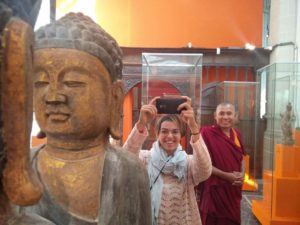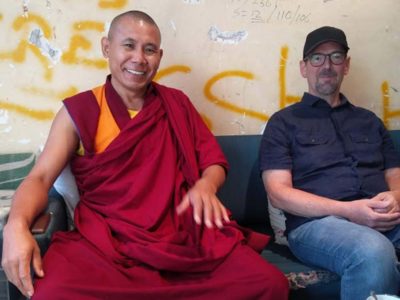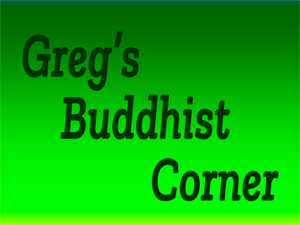Finding peace & space within this holiday season: advice from a Tibetan lama
By Greg Suffanti
QFWF, December 14th 2018
Lots and lots of people… lots and lots of stress… Bah humbug!
I used to love the idea of the Christmas holidays, and coming from America, I always looked forward to the over-the-top decorated stores and restaurants, and the ubiquitous Christmas music piped from every commercial establishment coast to coast.
Then I grew up and moved away from home; first, to the opposite side of the country, then to another continent. Christmas now means travel and hotels and people…. Lots and lots of people, and lots and lots of stress! Bah Humbug!
This week, I’m not preparing for the holidays, I’m preparing ME for the holidays

My stress level has been building these last couple of weeks as the holidays get ever nearer, and it wasn’t until the 4th or 5th time this week that my left arm starting getting numb and I felt suddenly weak.
That I realized, that even though I felt like I was about to have another stroke, this was just the face of stress rearing its ugly countenance… again.
This week, I’m not preparing for the holidays, I’m preparing ME for the holidays.
Buddhism teaches you how to play doctor, so that you know which medicine will be effective
Time to look into my Buddhist tool chest and see what the doctor ordered. Buddhism has taught me to look honestly at my internal world, so that I might then find an effective antidote to whatever is currently ailing me.
Problem? …. Let’s see… anxious, busy mind…. Busy mind that wants to make everything a problem: even though there aren’t really any problems! It just FEELS that way.
Answer: Calm Abiding, meditation, or as Geshe Yeshe Rinchen says, “peaceful abiding” meditation. Suddenly, my breathing becomes less tense and I begin to recall the advice Geshe Rinchen gave his students back on the 20th of October this year when he gave a lesson at Maitreya Instituut in Amsterdam on “Calm Abiding”.
“Meditation allows our mind to be calmer and happier”
“Meditation brings so much benefit, because the mind calms down and this allows us to be a bit happier,”
Geshe Rinchen says. Even 5 minutes of following the breath can bring an enormous inner change, and Geshe la encouraged us to all make an effort every day to meditate.
He said:
“We look for so many ways to attain happiness. Yet, there is no point to having all this material wealth if the mind is not happy. If you live your life this way there is no point to your life. With meditation, then your life has purpose. On this basis we can then make others happy as well. We want to subdue our mind through meditation.”
“Whenever we experience unhappiness we know the afflictions are at work”

“One’s own afflictions, like anger and attachment, are creating one’s own unhappiness… thus we have to subdue our own mind. If we subdue our own mind we’ll never experience unhappiness. If we engage in non-virtuous activities we’ll experience unhappiness.
Since what we wish for is happiness, we need to engage in virtuous activities. Non-virtuous activities are those with the intention of harming others. All non-virtuous activities stem from our afflictions, like our uncontrolled anger or desire. These states of mind disrupt the peace in our mind. Whenever we experience unhappiness we know that the afflictions are at work!”
“When anger manifests we perceive all as our enemy. When only anger is present, it takes over our mind and all our other qualities, like love and compassion, lie dormant. One’s totally unhappy when one is angry; and we make those around us unhappy. We might even think that life is pointless.”
“The value of a human being is to have a good heart”
“Buddha Shakyamuni has pointed the way out of the afflictions, and there are many methods to gradually decrease the afflictions. Peaceful abiding temporarily pacifies the afflictions. We need to rely on an antidote, and we need to train our minds, because the peace and happiness we are searching for is not something that ‘just happens’.
We ourselves must use our minds and think, “what should I do?” One must subdue one’s own mind…. Transform one’s mind…. Better one’s mind; changing from negative to positive. We are creating a new mind. That’s how we develop the good heart/mind. The value of a human being is to have a good heart. No one can buy a good heart. In our lives this is the most valuable thing. Without a good heart, we feel a lot of worry, attachment and anger.”
“All mind training is to achieve the good heart. To meditate is to habituate one’s own mind. To develop shiné or shamatha, we develop our concentration on a single object. We need this concentration, it is crucial to our development. How do we do this? Through cultivating our body, speech and mind in a virtuous direction.”
“We are creating a good quality cause in order to achieve a good quality result”
“A good person speaks in a sweet and smiling manner, and does not feel jealousy. A person with a good heart always experiences good things. All of this depends on taming the mind. To develop shiné or shamatha we develop our concentration on a single object. We need this concentration, it is critical to our development. We are creating a good quality cause in order to achieve a good quality result.”
“The results are different… even though the meditations for shine are the same!”
“Shamatha is common to both Buddhist and non-Buddhist traditions. Teachings on shamatha were in India before the Buddha, and were found in both Hindu and non-Hindu traditions. In the Mahayana tradition we take responsibility to make others happy.
Buddhists and non-Buddhists have different end goals. We are looking for liberation in Mahayana Buddhism. For this, the root of ignorance must be ended. We practice peaceful abiding to help us along toward our goals.
The results are different according to the tradition we follow, because the causes are different… even though the meditations for shiné are the same!”
“What kind of objects can we focus on? All kinds of positive objects, from flowers to Buddha. It is better to focus on a positive object and not to change it often. There is a quality of freshness when we are visualizing. We try to make the object clear, and then spend as much time as possible concentrating on our chosen object.”
“A confident mind is a happy mind”
“We need to elevate ourselves with confidence. We should think, ‘if others can do this, so can I’. One cultivates one’s confidence. Our minds are equal to the Buddha’s mind…. Both are clear-light minds, and any obstacles that we experience are adventitious, or temporary.
We can train and become exactly like the Buddha. Don’t put yourself down. Don’t think like this. A confident mind is a happy mind.”
“Laziness is the main obstacle”
“There are five obstacles that stop us from attaining peaceful abiding. For most of us, laziness is the main obstacle. The other four are: forgetting the instructions, distractions from laxity and excitement of the mind, not applying the antidote when needed, and finally, applying the antidote when not needed.”
“Peaceful abiding is the mind that perfectly focuses on one object”
“We must always ask, ‘where is my mind now?’. Our minds pervade our whole body, so we withdraw the mind from the outer world and begin to focus on the sensations from the tip of our toes to the top of our heads. We bring the mind inward. Peaceful abiding is the mind that focuses perfectly on one object. We need to develop memory and introspection; a mind that guards and investigates and supervises what memory is remembering. We develop special insight and wisdom: this mind investigates the mind of shamatha meditation. We need the union of shamatha and special insight, and we need these minds functioning together.”
“The cause of shamatha is love”
“We are looking to develop and grow our positive and virtuous states of mind. Love is most important of all. Love and kindness are most important for humans. The cause of shamatha is love. If you don’t have love, then why even be alive? If we become god people, this is what really matters. Everything depends on cultivating a virtuous mind and life.”
The good heart begins with love and compassion for others… including myself

Turning my attention inward helps me to see that I am fundamentally okay. Just a bit stressed. I see that my life is fundamentally okay. Thinking of love, I ask myself if I’m being kind and compassionate toward myself?
The answer is, “I need to work on this.” That’s okay, too. It’s been a busy year, and I can’t say I’ve gotten any closer to achieving shiné in my meditation practice, but, I can say I feel a bit kinder towards myself and the world, and although I don’t always feel love for those all around me… I’m trying.
And that, dear reader, is all any of us can do.










